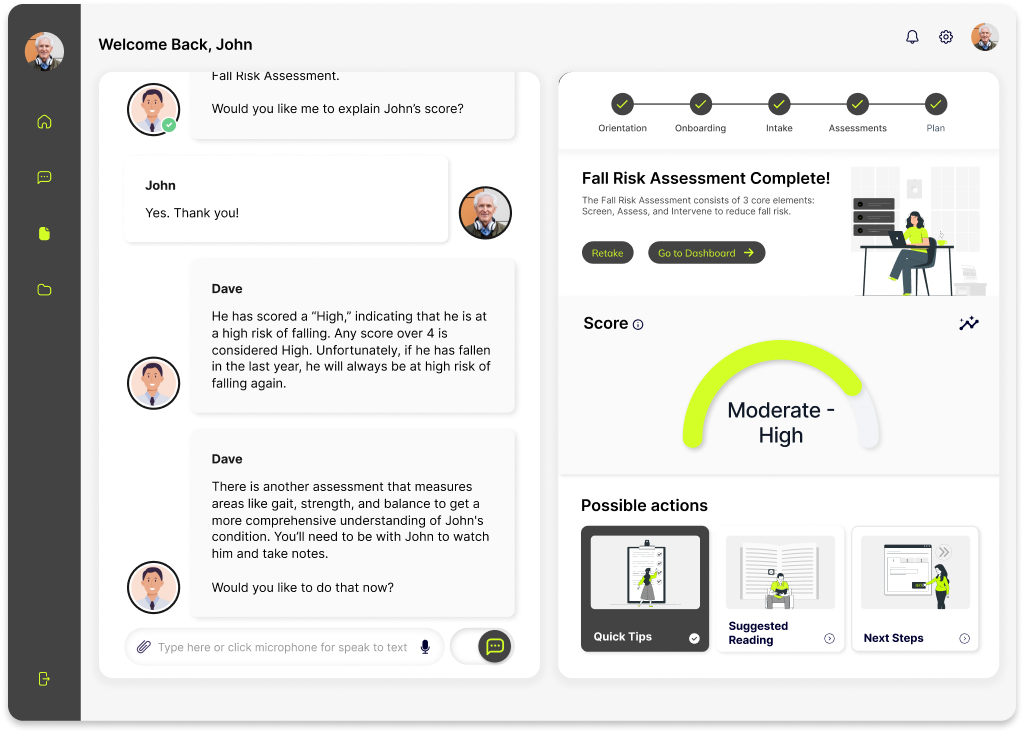Problem
Healthcare navigation is crucial in providing caregivers and patients with a clear understanding of resources and personalized care pathways. As healthcare platforms strive to meet diverse needs, the integration of AI and machine learning (ML) becomes essential for success.
A national non-profit supporting family caregivers faced challenges with staffing shortages, unaddressed caregiver needs, and improving platform scalability. They partnered with 10Pearls to make their existing platform more accessible and functional for family caregivers providing complex, intensive, and time-consuming care.
Challenge
Effectively enhancing this platform demanded careful consideration of how these conditions would affect a family caregiver and their preferred method of interaction through the platform. Naturally, different conditions require different levels of involvement and care.
Enhancements required considering caregivers’ diverse needs and preferred interaction methods. The upgraded platform had to educate caregivers, offer a user-friendly interface for all technical levels, provide multilingual support, and feature an emotionally intelligent AI agent that adapts communication based on urgency and stress.
Outcome
User-friendly interface
Personalized insights
Multilingual support
Empathetic chatbot
Increased user engagement
Improved access to relevant resources
Solution
To address these challenges, 10Pearls developed an AI-powered virtual agent with multilingual support, sentiment analysis, and a sophisticated knowledge management system. Using ML and advanced AI algorithms, the agent could retrieve unique medical records and relevant resources, creating a supportive experience for caregivers.
The “Did You Know” feature provided caregivers with medical information and resources in easily digestible formats. Advanced sentiment analysis allowed the AI agent to adjust its responses based on the caregiver’s tone, brevity, and grammar, offering concise answers for short, urgent queries and detailed responses for longer, descriptive inquiries. Similarly, if the caregiver seemed to be under stress, the AI agent would undertake a more empathetic and supportive tone with its responses.
The AI system could communicate in both Spanish and English. However, with further enhancements, it was possible to integrate support for every language. Exchanging messages with the AI agent in a different language required no settings changes. If the caregiver sent a message in Spanish, the AI agent would recognize that and respond intuitively.

DELIVERING ADAPTIVE
CARE AND
EXPERIENCES
DELIVERING
ADAPTIVE CARE
AND EXPERIENCES
The transformation of healthcare platforms with AI technologies represents a significant leap forward in healthcare navigation. This case underscores the potential of AI to address specific challenges within the healthcare sector, providing scalable, personalized, and efficient solutions that can adapt to the needs of various stakeholders.
As the healthcare landscape continues to evolve, embracing AI-powered solutions is paramount in driving inclusivity, accessibility, and ultimately, improving outcomes for caregivers and care recipients. The strides made in caregiver support through AI integration highlight its indispensable role in fostering a more compassionate and effective healthcare ecosystem.
Conversational Virtual Agents
Enhance user experiences with real-time virtual assistant, equipped with multilingual support, live sentiment analysis, human-like interactions, and 24/7 user support.